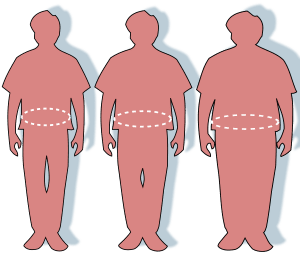Obese individuals achieve their goals :with health coaches
Table of Contents

Introduction
Obesity has become a global public health concern, with the World Health Organization (WHO) estimating that 13% of the world’s adult population was obese as of 2016[1].
This alarming trend not only affects an individual’s quality of life but also poses a significant burden on healthcare systems and society as a whole[2].
Obesity is linked to numerous chronic health conditions, including heart disease, type 2 diabetes, and certain cancers, which contribute to premature mortality and increased morbidity[1].
As a result, there is a growing need to address this issue through effective weight management strategies.
Approach that has gained traction in recent years is the use of health coaches, who can provide personalized support and guidance to help obese individuals achieve their goals
The role of health coaches in obesity
Through this comprehensive method:
Health coach are trained professionals who specialize in assisting individuals in making lasting lifestyle changes to improve their overall health and well-being[3].
Healthcare professionals such as dietitians, nutritionists, and personal trainers by employing a holistic approach, which considers not only physical health but also emotional and psychological factors[3].
Health coaches can effectively address the multifaceted nature of obesity, helping clients set realistic goals, develop tailored nutrition plans, and establish exercise regimens suitable for their unique needs.
The benefits of health coaching for obese individuals are numerous, ranging from improved weight management and enhanced physical health to better mental well-being and increased self-esteem[4].
Coaching can promote long-term behavior modifications, which are essential for maintaining weight loss and preventing weight regain[5].
Health coaches can assist obese individuals in achieving their goals, exploring the unique strategies employed by these professionals to address the challenges of obesity. Together, we can combat obesity and promote healthier lifestyles for all
Understanding the role of health coaches
Obesity continues to affect the lives of millions worldwide
The need for a comprehensive approach to weight management becomes increasingly important.
Health coaches play a vital role in providing personalized support and guidance to help individuals navigate the complexities of obesity and achieve their health goals.
The role of health coaches, how they differ from other healthcare professionals, and the holistic approach they use to address obesity.
A health coach is a trained professional who specializes in facilitating behavior change by empowering individuals to take control of their health and well-being[3].
They work collaboratively with clients to identify goals, develop personalized action plans, and provide ongoing support to overcome obstacles and achieve lasting success[6]. Health coaches are knowledgeable in various areas of wellness, including nutrition, exercise, stress management, and emotional well-being, allowing them to address the multifaceted nature of obesity[3].
Centered approach of health coaching
The role of a health coach is distinct from that of other healthcare professionals,
Such as dietitians, nutritionists, and personal trainers.
While these specialists focus on specific aspects of health, such as diet or exercise, health coaches adopt a more comprehensive approach , considering all aspects of an individual’s life that may impact their health[3].
This holistic perspective enables health coaches to identify underlying issues and provide guidance tailored to each client’s unique needs and circumstances.
Health coaches recognize that each individual’s journey towards better health is unique and requires personalized solutions.
Listening and engaging in open communication, health coaches can build rapport with their clients, fostering trust and promoting self-discovery[6].This collaborative relationship allows clients to take ownership of their health journey, increasing motivation and commitment to change[7]
Empowerment, evidence-based strategies, and addressing obesity
Principle of health coaching is its focus on promoting self-efficacy.
Health coaches help individuals recognize their strengths, develop problem-solving skills, and build confidence in their ability to make positive changes[8].
This empowerment approach allows clients to overcome barriers, sustain long-term behavior modifications, and ultimately achieve their health goals[5]. Research has shown that increased self-efficacy is associated with improved weight management outcomes, highlighting the importance of this aspect in addressing obesity[5].
Health coaches also utilize evidence-based strategies to support their clients, ensuring that the guidance provided is grounded in scientific research. These strategies may include motivational interviewing, goal-setting, and cognitive-behavioral techniques, which have been shown to be effective in facilitating behavior change and weight loss[6,8].
Health coaches play a crucial role in helping obese individuals achieve their goals by providing personalized support and guidance through a holistic approach. Skill set and emphasis on client-centered care, self-efficacy, and evidence-based strategies set them apart from other healthcare professionals, making them well-suited to address the complex challenges of obesity.
Struggling with obesity can gain the knowledge, tools, and support necessary to transform their lives and achieve lasting health and well-being.
How health coaches can help obese individuals
Services and strategies to assist obese individuals in achieving their weight management .
Personalized support and addressing the unique needs and circumstances of each client, health coaches can facilitate lasting behavior change and improve overall health and well-being.
Furthermore, health coaches can promote body positivity and self-acceptance, fostering a healthier relationship with food and self-image[8].
Providing personalized support in areas such as goal setting, nutrition, exercise, and emotional well-being, health coaches can help clients achieve lasting success in their health journey.
With the assistance of a health coach, obese individuals can overcome barriers, build self-efficacy, and ultimately transform their lives for the better.
Personalized goal setting nutrition plans
Establishing realistic and attainable goals :
Health coaches work with clients to identify specific, measurable, and time-bound objectives that align with their individual needs, preferences, and motivations[7].
By breaking down larger goals into smaller, achievable milestones, health coaches can help clients maintain motivation and track progress over time[8].
Health coaches are knowledgeable in nutrition and can help clients develop individualized meal plans that consider their dietary needs, preferences, and lifestyle factors[3].
Guidance on portion control, balanced meals, and mindful eating practices, empowering clients to make healthier food choices and develop sustainable eating habits[8].
Health coaches can help clients navigate challenges such as dining out or managing cravings, ensuring long-term success in their nutrition journey.
Developing an appropriate exercise regimen
Physical activity is a vital component of any weight management plan.
Health coaches can help clients identify activities that are both enjoyable and suitable for their fitness level, reducing the risk of injury and increasing adherence[5].
Increasing the intensity and variety of exercises, clients can build endurance, strength, and confidence in their ability to maintain an active lifestyle[7].
Regular check-ins and progress tracking are essential for sustaining motivation and identifying areas for improvement[6].
Health coaches offer consistent support and encouragement, helping clients navigate setbacks and celebrate successes along the way[7].
Partnership fosters self-efficacy and commitment to change, increasing the likelihood of long-term weight management success[5].
Benefits of health coaching for obese individuals
The utilization of health coaching
Services has been associated with numerous benefits for obese individuals, ranging from improved weight management to enhanced mental well-being.
We will discuss the various advantages of health coaching and how these benefits contribute to long-term success in achieving health goals.
Health coaching offers a multitude of benefits for obese individuals, including improved weight management, enhanced physical and mental health, increased self-esteem, and motivation for long-term lifestyle changes.
Addressing the unique needs and challenges of each client, health coaches can effectively facilitate lasting behavior modifications and promote healthier lifestyles.
The benefits of health coaching for obese individuals highlight the potential impact of this approach in combating obesity and improving overall well-being.
Improved weight management and physical health
Providing personalized support in areas such as goal setting, nutrition, and exercise, health coaches can help obese develop
Health coaching has been shown to be effective in facilitating weight loss and promoting long-term weight management in obese individuals[5].
The emphasis on self-efficacy and empowerment enables clients to take control of their weight management journey, increasing the likelihood of lasting success[7].
Obesity is associated with a range of chronic health conditions, including heart disease, type 2 diabetes, and certain cancers[1].
Assisting clients in achieving and maintaining a healthy weight, health coaches can help reduce the risk of these conditions and improve overall physical health.
The incorporation of regular physical activity and balanced nutrition into clients’ lifestyles can lead to improvements in cardiovascular fitness, strength, and flexibility, further contributing to enhanced well-being[5].
Better mental well-being
Health coaches recognize the importance of addressing emotional and psychological factors that may impact an individual’s weight management journey[3].
Providing guidance on stress management, coping with emotional eating, and fostering self-acceptance, health coaches can help clients improve their mental well-being.
Research has shown that individuals who engage in health coaching report reduced levels of stress, anxiety, and depression, highlighting the potential benefits of this approach for overall mental health[4].
Higher self-esteem and confidence for long-term
Promote body positivity and self-acceptance, help obese develop a healthier relationship .
Obesity can negatively affect an individual’s self-esteem and confidence, which may in turn hinder their ability to achieve their health goals[8].
As clients make progress in their weight management journey, they often experience increased self-esteem and confidence, which can further contribute to their motivation and commitment to change[7].
Health coaching focuses on facilitating lasting behavior modifications, rather than relying on short-term fixes or fad diets[3].
By empowering clients to take control of their health journey and providing ongoing support, health coaches can foster a sense of ownership and commitment to change.
This increased motivation and engagement can help clients sustain long-term lifestyle changes, ultimately improving their overall health and well-being[5].
Finding the right health coach
Choosing the right health coach is essential :
Maximizing the benefits of health coaching and ensuring a successful weight management journey.
We will discuss the key factors to consider when selecting a health coach and offer guidance on finding the best fit for your individual needs and goals.
Finding the right health coach is a crucial step in ensuring a successful weight management journey for obese.
Factors such as credentials, experience, personal compatibility, coaching style, accessibility, and recommendations, you can select a coach who is well-equipped to address your unique needs and goals.
With the support of the right health coach, you can embark on a transformative journey towards improved health and well-being.
Credentials and training with obese individuals
Important to ensure that they possess the appropriate credentials and training.
Look for coaches who have completed an accredited health coaching program, such as those offered by the National Board for Health & Wellness Coaching (NBHWC) or the International Coach Federation (ICF)[2].
These certifications indicate that the coach has met established standards of competence and professionalism in the field of health coaching[3].
As obesity presents unique challenges and considerations, it is important to choose a health coach with experience working specifically with obese clients[7].
This specialized knowledge will ensure that the coach is well-equipped to address the distinct needs and concerns of obese individuals, such as managing comorbidities developing appropriate exercise regimens, and addressing emotional eating[5].
Personal compatibility style and approach
Look for a coach who actively listens:
A strong rapport and trust between the client and coach are crucial for a successful coaching relationship[6].
Before committing to a health coach, consider scheduling a preliminary consultation to assess your personal compatibility.
Feeling comfortable and supported by your coach can greatly enhance the effectiveness of the coaching process[7].
Different health coaches may employ varying styles and techniques, so it is important to find a coach whose approach aligns with your preferences and learning style[3].
Some coaches may focus more on goal-setting and accountability, while others may emphasize emotional well-being and self-discovery. .
Discuss your specific needs and goals with potential coaches to ensure that their approach is well-suited to your individual circumstances
Accessibility and availability recommendations
Consider the practical aspects of scheduling and communication.
Ensure that the coach is available during times that are convenient for you and that their location is accessible, either in-person or through virtual coaching sessions[4].
Regular check-ins and progress tracking are essential components of health coaching, so it is important to choose a coach who is responsive and readily available to provide support when needed[6].
Gathering feedback from past clients or seeking recommendations from trusted sources can provide valuable insights into a coach’s effectiveness and style[3].
Reading testimonials or speaking with former clients can help you gauge the coach’s success in helping obese individuals achieve their goals and determine whether their approach might be a good fit for you
Conclusion
In conclusion, health coaches play a critical role in supporting obese individuals on their journey to achieving their health and wellness goals. Through personalized goal-setting, tailored nutrition plans, appropriate exercise regimens, ongoing support and accountability, and addressing emotional and psychological factors, health coaches can effectively facilitate lasting behavior change and improve overall well-being[7].
Health coaching for obese individuals are numerous, including improved weight management, enhanced physical and mental health, increased self-esteem, and motivation for long-term lifestyle changes[5].
Factors such as credentials and training, experience with obese clients, personal compatibility, coaching style, accessibility, and recommendations should be considered when choosing a coach that best fits individual needs and goals[3].
Support of a skilled health coach, obese individuals can overcome barriers, build self-efficacy, and ultimately transform their lives for the better. Health coaching represents a valuable resource in the ongoing battle against obesity and its associated health risks, offering a comprehensive and personalized approach to promoting healthier lifestyles and improved overall well-being[5].
References
- World Health Organization. (2020). Obesity and overweight. https://www.who.int/news-room/fact-sheets/detail/obesity-and-overweight
- Withrow, D., & Alter, D. A. (2011). The economic burden of obesity worldwide: a systematic review of the direct costs of obesity. Obesity Reviews, 12(2), 131-141.
- Wolever, R. Q., et al. (2013). A systematic review of the literature on health and wellness coaching: Defining a key behavioral intervention in healthcare. Global Advances in Health and Medicine, 2(4), 38-57.https://pubmed.ncbi.nlm.nih.gov/24416684/
- Kivela, K., Elo, S., Kyngas, H., & Kaariainen, M. (2014). The effects of health coaching on adult patients with chronic diseases: A systematic review. Patient Education and Counseling, 97(2), 147-157.
- Annesi, J. J. (2016). Behaviorally supported exercise predicts weight loss in obese adults through improvements in mood, self-efficacy, and self-regulation, rather than by caloric expenditure. The Permanente Journal, 20(1), 17-22.https://www.ncbi.nlm.nih.gov/pmc/articles/PMC3048629/
- Ammentorp, J., Uhrenfeldt, L., Angel, F., Ehrensvärd, M., Carlsen, E. B., & Kofoed, P. E. (2013). Can life coaching improve health outcomes? – A systematic review of intervention studies. BMC Health Services Research, 13, 428.
- Sforzo, G. A., Kaye, M. P., Todorova, I., Harenberg, S., Costello, K., Cobus-Kuo, L., … & Moore, M. (2018). Compendium of the Health and Wellness Coaching Literature. American Journal of Lifestyle Medicine, 12(6), 436-447.https://pubmed.ncbi.nlm.nih.gov/30542254/
- Olsen, J. M., & Nesbitt, B. J. (2010). Health coaching to improve healthy lifestyle behaviors: An integrative review. American Journal of Health Promotion, 25(1), e1-e12.https://pubmed.ncbi.nlm.nih.gov/20809820/









